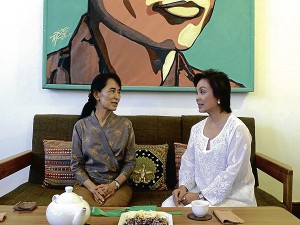Over tea and cookies with Burma’s icon

THE WOMAN UNDERNEATH THE ICON Sen. Loren Legarda, the first Filipino high government official to visit Aung San Suu Kyi in December 2010 shortly after her release from two decades of house arrest, discovers the feminine side of this living legend. CONTRIBUTED PHOTO
She cooks, fixes leaks and can live without a cell phone or the Internet. And she’s proud of her country’s lotus shawls.
Aung San Suu Kyi, known as an international symbol of democracy, is a simple woman who finds pleasure in the simple joys of life. And revels in the kindness of her two sons.
It was a close friend, a Nobel Peace laureate like her, who arranged my meeting with Suu Kyi at her home one day after Christmas of 2010. Finally going to that old mansion by the lake on University Avenue in Burma’s (Myanmar) capital, Rangoon, was the realization of a longtime aspiration to meet Burma’s icon of democracy.
How did Daw Suu (daw is an honorific for a revered woman, literally meaning “aunt”) maintain her sanity during those 20 years of house arrest?
In her marked calm manner, she said nonchalantly that she literally had to plug the leaks of her ancestral home. She confessed to receiving all her news from a transistor radio during those dark years as she had no cell phone or computer that had access to the Internet. In fact, at the time of our visit, her application for Internet connection was still pending.
She expressed her interest in cooking while serving me and my sons tea and cookies. In fact, she even welcomed the idea of having a Filipino cookbook (which I eventually sent).
Proud of the rural livelihoods in her country, Daw Suu advised me to go to Inle Lake and buy the traditional lotus shawl culled from the lotus flower so abundant in Burma. I did as told and did not regret her suggestion.
On more serious matters, Daw Suu expressed appreciation for the Philippines’ consistent and steadfast support of her quest for democratic reforms in Burma. She, in fact, wrote a handwritten letter to President Aquino, which I personally handed to him.
However, she expressed disappointment with the Association of Southeast Asian Nations (Asean), noting that it is not cohesive enough and does not stand up for her cause, so unlike the African nations who rallied behind the opposition leader of Ivory Coast at that time.
But she said it was understandable due to the economic interests of some Asean nations.
When asked if she would eventually submit herself to another election, she said she would only consider such in an inclusive political process. At that time, it did not seem imminent.
She said she would visit Thailand and Norway once she is allowed to travel again, which was what she exactly did.
She is once again calling attention to Burma.
Sons’ kindness
There was never any trace of bitterness or anger in her words or demeanor during our conversation. She was always calm and serene, firm yet gentle, beautiful in her simplicity.
She did not seem bothered at all that we were intruding on an afternoon after Christmas. She spoke lengthily to my sons and said they were the first non-Burmese youth she had seen and met in 20 years. That was touching.
She spoke of kindness, as she did on her long-delayed acceptance speech for her 1991 Nobel Peace Prize in Oslo, Norway. But this time, she spoke of her sons’ kindness, saying they never blamed her for their situation, considering that she had not seen them for a very long time. At this point, I could not help but shed a tear, as a mother, as a woman.
Daw Suu spoke much of the sufferings of her people and the need for basic health care, employment, nutrition and of justice for the many who are maimed, abused and killed. She stressed the need for ethnic conciliation and for harmony of the various ethnicities.
Suu Kyi stands for the ideal social consciousness, of the need for compassion, of the belief in democracy, freedom and the fair and just treatment of every human being and the capacity of every human being to act with compassion, strength, courage and determination.
Faded portrait
During our visit to the country, we noticed a framed, faded portrait of a young Suu Kyi in the backroom of a lacquerware shop in Bagan, an ancient city located in the Mandalay Region of Burma. It was placed on the top shelf in place of an image of the Buddha or a long-lost parent. This was in December 2010, just over a month after the release of the Burmese prodemocracy leader from house arrest. Even then, conspicuous acknowledgment of the Lady, as she is often called, was simply not done.
Gesturing toward the photograph, I mentioned Daw Suu’s nascent freedom. The shop owner beamed, and was quick to declare that the portrait had stayed there all throughout Daw Suu’s imprisonment. This felt like a silent yet staunch act of protest.
Yes, the portrait may have been left in the very rear of the shop, only a flickering fluorescent lamp illuminating it, but it was wreathed in silk garlands, and was an obvious source of pride and inspiration. The shop owner, a warm, excitable woman, began to speak of Daw Suu in a hushed, considered tone: “We love her. We have hope. We believe she can help Burma.”
It seemed as if she was speaking for the entire country. As my sons and I discreetly spoke with more Burmese people, it soon became clear that she may as well have been.